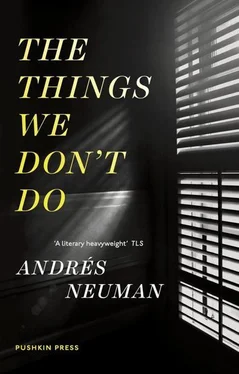Monday 28 May. Encouragingly, Juan seems to have accepted my frequent questions as a given, and he dutifully submits to answering them. The fictitious confidences I have been forced to share with him have been reduced to a minimum, and for the most part I limit myself to listening and, rather ironically, to exercising my true role. That is to say, to pretending I am a patient who prefers to listen to the confidences of his garrulous therapist.
I am not unaware that Juan’s progress has a complexity and subtlety that never cease to surprise me. Not only does the patient pretend that it is he who in theory is treating me, he now makes as if he is grudgingly tolerating my questions. He regularly expresses in no uncertain terms his displeasure and unease during these interrogations. In other words, Juan appears to be on the way to overcoming part of his previous conflict, but only at the cost of starting a fresh one between us. I trust it will be provisional, a sort of pain-scaffolding. In the meantime, the patient speaks less about his parents’ objective presence in the house and evokes their image instead, focusing on the emotional meaning they had for him. As I say, these symptoms are positive.
The only shadow hanging over this well-founded optimism is that, after many months, I yielded to temptation and called my father to talk about Juan, who is without doubt the most intricate patient I have ever treated. Perhaps I wasn’t seeking his professional opinion so much as his parental approval. That is possible. The point is that when I left my practice this afternoon, I called my father to discuss the case with him. And (to my disappointment) he not only strongly advised me to discontinue the game of role reversal, but expressed the opinion that I should hand the case over to a colleague immediately.
Although it shouldn’t, this has renewed my doubts about my approach to Juan. I don’t know why I mentioned him to my father, when I am all too conscious of how our discussions end up. With him always trying to come out on top. When I got home I told Mama about it. As usual, she said nothing.
MY FALSE NAME (An Argentinian Memoir)
WHY DO THEY HURT like this? Do they hurt when they return? Or perhaps they only heal when they return, and then we realize they had been hurting for so long, these memories? We travel inside them. We are their passengers.
There’s no way of knowing for certain if it was him, or possibly his father, or perhaps his grandfather. But Jacobo’s surname, my own surname, was born of a deception. It’s possible that, somewhere in the world, some distant relative still knows the exact details. I prefer to accept the version I heard as a child: the one that tells of a timely betrayal and an intelligent cowardice.
My paternal great-grandfather, or possibly his father, or perhaps his grandfather, lived in Tsarist Russia. It was common for boys from poor families, especially Jewish ones, to be forced to do military service in regions close to Siberia, under inhuman conditions. So great was the terror of being conscripted, and the chances of surviving two years of training seemed so slight, that many chose to maim themselves in order to be exempted. Jacobo, or perhaps his father, or possibly his grandfather, knew several youths who were missing an ear, a hand or an eye. Even in that state, they were pleased with their lot.
But my great-grandfather, or perhaps my great-great-grandfather, or possibly his father, felt too attached to all his limbs to be able to contemplate such a sacrifice. So Jacobo (let’s choose him — he deserves it) hit on a plan that would allow him to keep his body intact without having to join the army. Did he ask for help from some distant relative in order to falsify his real identity? Did he bribe some Russian customs official so that he could emigrate? Or did he turn, as I once heard and like to think, to a certain friend of a friend, who helped him steal the passport of a German soldier by the name of Neuman?
The only certainty is that, thanks to his admirable cowardice, and rebaptized in this timely way, zeide Jacobo found himself far from the town of Kamenetz, in today’s Ukraine, when the First World War broke out. Not just far: in another world. In my native Buenos Aires.
The bride that Jacobo found in Argentina, following a disturbing custom of the time, was his first cousin. Her name was Lidia, and she was born in Lithuania. The remainder of her true name is lost in speculation or in the whims of a port official in Buenos Aires. There, at a counter in the Hotel de Inmigrantes, somebody wrote what looks like “Jasatsca”. From what I can deduce, Lidia’s original name must have been quite close to Chazaka, which is the feminine form of Chazacky, or possibly Jasatsky, as her male nephews continued to call themselves. So, in part thanks to history, in part thanks to chance and in part thanks to invention, the trace of the names of those great-grandparents is quite similar to my own memory.
Baba Lidia was extremely thin and had unusual sapphire eyes. Several of her sisters had died in Lithuania during the pogroms. Before emigrating to Argentina, her childhood had been marked by hunger. Lidia had spent many winter mornings queuing for bread, which was in short supply, and ran out soon after dawn. On one occasion, she used to tell us, it had been such an effort to keep her place in the line, and the night air had numbed her muscles so much, that when at last the bakery opened, because of the sudden, sensual smell of freshly baked bread, Lidia passed out very close to its door. She quickly came round, but by that time the bread had flown out of the bakery, and her back was covered in muddy footprints.
In the early years, zeide Jacobo had only a hat business that he himself had set up in the flat where they both lived. They had two rooms: one for eating and sleeping, the other for making hats. But apparently the Argentina of those days would not easily permit anyone to go around with his skull uncovered. By avoiding all unnecessary expense and taking no holidays for years, Jacobo prospered until he became a wholesaler of imported textiles. This market was less demanding, because all it involved was the sale of lengths of fabric to be made into clothes. It was thanks to this second undertaking that he began to amass a small fortune.
From the 1930s on, my grandfather Mario grew up enjoying privileges far removed from the hardships his parents had suffered. The family drove around in an automobile, and there are those who maintain that they even had a chauffeur. Jacobo for his part acquired the reputation of being the slowest driver in Buenos Aires: he rarely exceeded twenty kilometres an hour. “Slowly does it, slowly,” he would mutter at the wheel, his eyes fixed on the road, always keeping his smile, to the desperation of passengers in general, and the nervous Lidia in particular.
Later on, the longed-for male grandchild came into the world. My father’s childhood coincided with the period when Lidia and Jacobo lived in Calle Peña, near the central corner of Las Heras and Pueyrredón. In those years, my father went to the secular Jewish school that Jonás, my other paternal great-grandfather, had helped found. My father frequently visited their house when he was coming home from school. The piano room and its big sliding doors (walls that moved!) were a source of constant amazement to him. The servants’ quarters gave on to an interior courtyard, which meant that part of the house seemed as secret and dark as the class struggle. This was the domain of Magda, an old Central European cook who spoke an approximate Spanish full of echoing stutters. And that was where my father ran to hide whenever he wanted to annoy Lidia. Although they say Magda was an excellent cook, in reality she very seldom did any cooking: exercising a paradoxical form of hierarchy, the baba wouldn’t allow anyone to do it in her place. So old Magda had to make do with helping her prepare the ingredients, cleaning the kitchen utensils and watching how her mistress concocted the menu every day. My father told me that my great-grandmother Lidia — with a mixture of caution and suspicion, as though still afraid the crowds might trample on her to steal something — always kept her things in little bags that went inside boxes that were put in more bags.
Читать дальше












